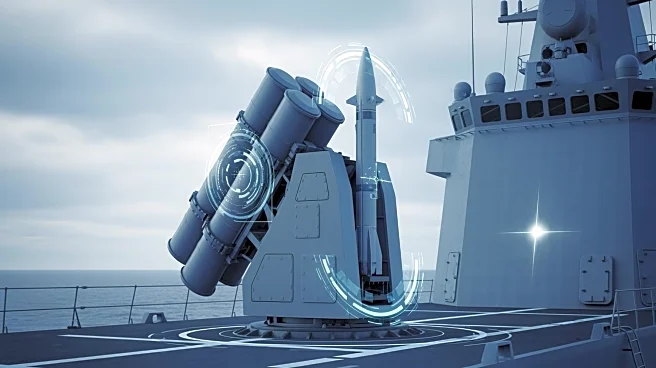What's Happening?
Diehl Defence and Lockheed Martin have announced a collaboration to explore the integration of Diehl's IRIS-T missiles into Lockheed Martin's Mk41 Vertical Launch System (VLS), which is widely used by
Western navies. This partnership aims to enhance naval air defense capabilities by potentially incorporating the IRIS-T missiles into the Aegis Weapon System, a comprehensive naval defense system utilized by countries such as the United States, Spain, and Norway. The Mk41 VLS is currently employed by 17 navies and installed on over 200 ships, offering a modular system that can be equipped with various missile types, including the Tomahawk cruise missile. The collaboration is seen as a step towards increasing European autonomy in defense, aligning with the European Union's goals. Diehl and Lockheed Martin have signed a memorandum of understanding to further explore the integration possibilities, focusing solely on naval applications.
Why It's Important?
The collaboration between Diehl Defence and Lockheed Martin is significant as it represents a strategic move towards enhancing naval defense capabilities and increasing European autonomy in military technology. By integrating the IRIS-T missiles into the Mk41 VLS, European countries could reduce their reliance on U.S. missiles for naval air defense, thereby strengthening their defense infrastructure. This development aligns with the European Union's push for greater self-sufficiency in defense systems, potentially leading to more robust and independent military capabilities across the continent. The partnership also highlights the importance of international cooperation in advancing defense technologies, which could lead to improved security measures for navies globally.
What's Next?
Following the memorandum of understanding, Diehl Defence and Lockheed Martin will delve into detailed exploration of integrating the IRIS-T missile family into the Aegis system and Mk41 VLS. This process will involve technical assessments and potential modifications to ensure compatibility and optimal performance. The collaboration may also prompt other European countries to consider similar partnerships to enhance their defense capabilities. As the integration progresses, stakeholders such as military leaders and defense contractors will likely monitor developments closely, assessing the impact on strategic defense planning and procurement decisions.
Beyond the Headlines
The collaboration between Diehl Defence and Lockheed Martin could have broader implications for the defense industry, particularly in terms of technological innovation and international partnerships. By focusing on naval applications, the partnership may pave the way for future collaborations in other areas of defense technology, such as ground-based systems. Additionally, the move towards greater European autonomy in defense could influence geopolitical dynamics, as countries seek to balance reliance on foreign technology with domestic capabilities. This development may also stimulate discussions on the ethical and strategic considerations of defense technology integration and its impact on global security.









